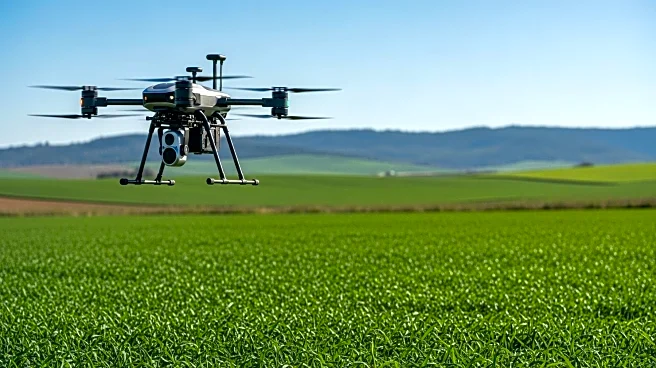What's Happening?
Czech startup Skymaps has introduced Zoneye, an AI-powered model designed to identify and locate weed populations in agricultural fields. This model is integrated into Skymaps' CultiWise platform and is trained to recognize 37 common weed species using drone-captured images. Zoneye allows farmers to upload drone images to a cloud-based system, which then processes the data to deliver precise maps indicating the location, density, and species of weeds. This technology aims to reduce input costs by up to 50% and increase crop yields by up to 20%. The system also assists in optimizing herbicide application and seeding rates, thereby enhancing overall farm productivity.
Why It's Important?
The introduction of Zoneye represents a significant advancement in precision agriculture, offering farmers a tool to manage weeds more effectively while minimizing environmental impact. By providing detailed weed maps, the technology enables targeted herbicide application, reducing chemical usage and associated costs. This not only benefits farmers economically but also supports sustainable farming practices by decreasing the environmental footprint of agricultural operations. Additionally, the ability to adjust seeding rates and predict harvest yields can lead to more efficient resource management and planning, further enhancing the profitability and sustainability of farming enterprises.
What's Next?
Zoneye is set to be showcased at Agritechnica 2025 in Germany, where it will be presented to a broader audience of agricultural professionals. This event could lead to increased adoption of the technology as more farmers become aware of its capabilities. As the system gains traction, it may prompt further innovations in AI-driven agricultural solutions, potentially influencing industry standards and practices. Stakeholders in the agricultural sector, including policymakers and environmental groups, may also take interest in the technology's potential to promote sustainable farming.
Beyond the Headlines
The deployment of AI in agriculture, as exemplified by Zoneye, highlights a broader trend towards digital transformation in the industry. This shift could lead to long-term changes in how farms operate, with increased reliance on data-driven decision-making. Ethical considerations may arise regarding data privacy and the impact of technology on traditional farming jobs. However, the potential for AI to contribute to food security and environmental conservation presents a compelling case for its continued development and integration into agricultural practices.











